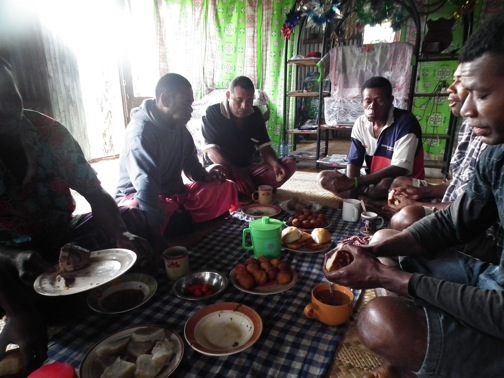I just came back from spending several days in a remote Fijian village. I know, I should have been spending my time relaxing on the beach by our resort, but I couldn’t help myself – I wanted to see how the locals really live. So I hopped on a local transport (buses don’t run there) and went as far into the interior of Viti Levu as I could get without walking (and there are still villages you can only access by walking quite far).
One of the most interesting things about our visit to Fiji was the reception we got as Jews there. Most people actually said they were honored to meet us – members of the “chosen people!” “I have only read about the Jews in the Bible,” said Mario, head of my village host family, “but here I see one before my face!” The people I met were overwhelmingly excited to hear about Jewish life and culture, and just plain to meet someone from a culture and religion they had heretofore placed only in the realm of legend.

Mealtimes in the village, even breakfasts, were huge affairs with many people in attendance. These gatherings were not just about eating, but were also about story-telling - and the stories they wanted to hear were from me! They wanted to learn about the Jews.
Mealtimes in the Fijian village were an affair. Even breakfast was a big ordeal with people coming from homes all around and converging on one house to share food and stories. Doors and windows are always open and if someone walks by outside, the residents within will shout to that person to come and join them – and often they will! So when I sat down and joined them, they were all very excited and began to ask me dozens of questions. What was interesting was their reaction when I told them of the Jews’ history: being exiled from the land of Israel, then chased out of many countries on pain of death. “But why?” they asked me. “Why would they want to kick out the Jews? Fiji has never done this!” Why indeed…
To be asked this question in the last few days by these native Fijians shocked me to my core. How apropos! In fact, in this week’s parsha it says, “And all the nations will say, ‘For what reason did Hashem do so to this Land; why this wrathfulness of great anger?’ And they will say, ‘Because they forsook the covenant of Hashem, the G-d of their forefathers…’” This is exactly the answer I had to give the Fijians. The Jews have not followed completely the word of G-d, the law of G-d, and therefore have been punished mightily.
It’s easy for us to look around and find others doing aveiros (sins), violating the laws of the Torah. It’s easy to look at someone who is not as religious and say, “That person does not make a blessing before eating bread!” It’s easy to look at someone who is religious and to find their fault, to say, “That person wears a hat and a beard but he uses curse words!” But what’s not easy is to look at ourselves and realize that we are as guilty – or, truthfully, more guilty – as any other person. We all violate the laws of the Torah, every day. We are fallible, we are human, we make mistakes. This is why so many people in the world still hate us and chase us out. This is why we continue to eagerly await moshiach. Not because of him, or her, but because of me.
Now is the time to do teshuva (repentence). With Rosh Hashana coming up, it’s an important wake-up call for us. In just a few days, we will be inscribed in the book of life… or death. Just days after that, the judgement will be sealed, and we cannot change it. Now is the time to return to G-d, to accept our faults and recognize them so that we can admit them to Him and so that we can make a commitment to doing better in the future. We shouldn’t have to have the nations of the world asking us these questions in order to ask them ourselves. We should be doing it every day, and especially now. This Shabbat, let’s try introspecting and looking inward at ourselves, in preparation for the days of holiness ahead.
Shabbat shalom!
Read More





